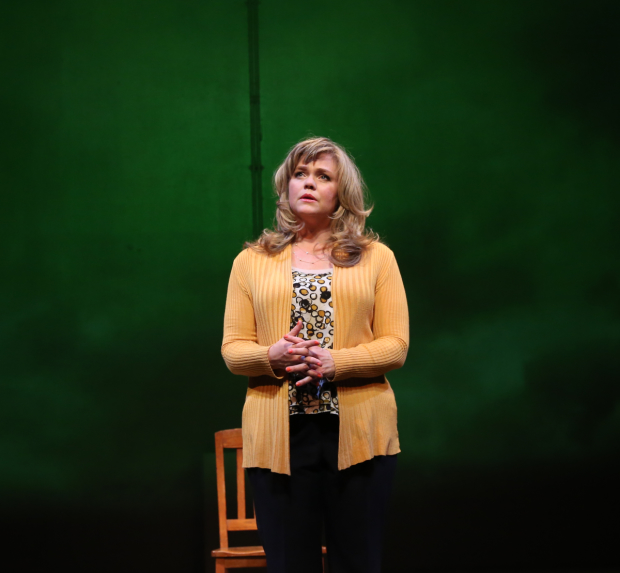When It's You

(© Carol Rosegg)
A mass shooting is at the center of Courtney Baron's When It’s You. A man has shot 12 people and killed four, including himself — a story that could, sadly, be taken right from today's headlines. With a topic so timely, it's a shame that this one-act solo play, now running at Theatre Row's Clurman in a Keen Company production, lacks a sufficiently compelling plot and the dramatic heft to contribute to a serious discussion of one of the most dire problems facing our society today.
A lonely 37-year-old named Ginnifer (played with amiable charm and sensitivity by Ana Reeder) has returned home to Dallas after living in St. Louis for the past 17 years. Family obligations have drawn her back to Texas, but she finds herself receiving unwanted attention from the community when it is revealed that she once dated a local man named Jason who recently shot and killed several people before taking his own life. What did Ginnifer know about him? Did any of Jason’s behaviors from 17 years ago clue her in to his violent temperament? These are some of the questions that old friends ask her. But the toughest question facing Ginnifer, as she looks back on her brief relationship with Jason, is how it's possible that she could have loved someone who committed such an evil act.
Reeder gives a wonderfully nuanced performance as Ginnifer, exuding down-home friendliness and speaking with a soft Southern accent. But we gradually come to suspect that Ginnifer is not an entirely reliable narrator, concealing her true feelings beneath an anguished, teary-eyed smile. "I'm not here to talk about Jason Hanley," she says to the audience, who observes her like a panel of doctors at a therapy session. But we know that Jason, not his victims, is exactly whom she wants to discuss. There's a subtle psychology in Reeder's portrayal that fascinates throughout.
This, unfortunately, is not enough to lift the play out of the doldrums of Baron's slowly paced plotting. We're given piecemeal insights into Ginnifer's background — her lonely life in St. Louis, her ailing mother, her poignant, unfulfilled desire for a child (represented by a Cabbage Patch Kid). But like a sputtering engine, the story doesn't leap into gear until the revelatory ending.
Jonathan Silverstein's direction keeps the show going at a slow boil for most of its 70 minutes. Reeder stands center stage on Steven Kemp's nearly empty set, which consists of a chair and a box that contains Ginnifer's doll. Blinking fluorescent lights far above the stage (lighting effects by Josh Bradford) and occasional rumblings of thunder along with the pattering of rain (sound design by Bart Fasbender) seem intended to add dramatic, expressionistic flourishes to Ginnifer's monologue, but their inclusion distracts from the telling more than it illuminates. When Ginnifer says she can make the lights flicker with her mind, we pause to wonder about her mental well-being, but ultimately, Baron hasn't aroused enough interest to make us want to know more.
No doubt, there's an important story to be told regarding the psychological repercussions suffered by those involved with the perpetrators of violence. When It's You attempts to explore that issue but comes up short in translating the experience of one person's "me" to society's "we."











